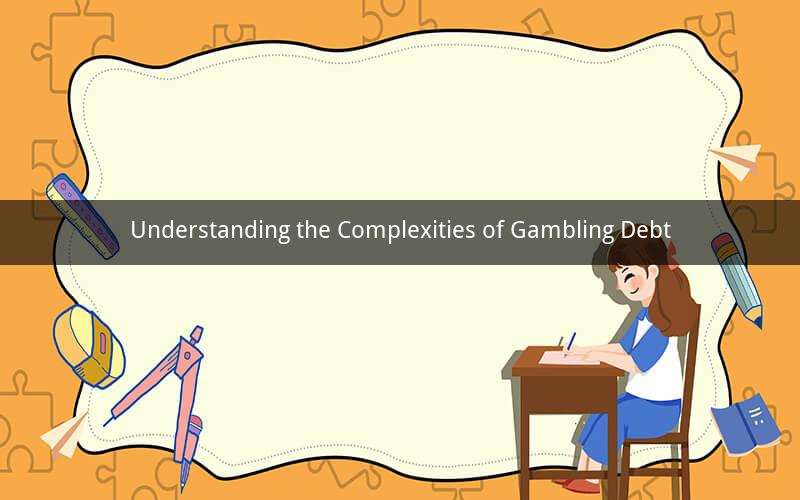
Gambling debt, a term that encompasses a wide range of financial obligations resulting from gambling activities, has become a significant concern for individuals worldwide. This article delves into the various aspects of gambling debt, exploring its causes, consequences, and available solutions. By shedding light on this issue, we aim to provide a comprehensive understanding of what gambling debt entails.
I. Definition and Causes of Gambling Debt
Gambling debt refers to the financial obligations incurred by individuals who have lost money while engaging in gambling activities. It can arise from various forms of gambling, such as casinos, sports betting, lottery tickets, and online gambling platforms. The causes of gambling debt can be categorized into several factors:
1. Psychological Factors: Individuals with addictive personalities or those struggling with mental health issues, such as depression or anxiety, may be more susceptible to developing gambling debt. These individuals often seek refuge in gambling as a means to escape their problems or cope with stress.
2. Financial Factors: Financial difficulties, such as unemployment, low income, or high expenses, can lead individuals to turn to gambling as a way to alleviate their financial burdens. However, this often results in a vicious cycle of debt, as the debts accumulate and become increasingly challenging to repay.
3. Social Factors: Peer pressure, the desire to fit in with a certain social circle, or the influence of media and advertising can contribute to the development of gambling debt. Individuals may feel compelled to engage in gambling activities to maintain their social status or impress others.
II. Consequences of Gambling Debt
The consequences of gambling debt can be far-reaching, affecting both the individual and their loved ones. Some of the most significant consequences include:
1. Financial Ruin: Accumulating gambling debt can lead to financial ruin, as individuals struggle to keep up with their obligations. This can result in eviction, foreclosure, and the loss of essential assets, such as vehicles or property.
2. Emotional and Psychological Impact: The stress and anxiety associated with gambling debt can have a detrimental effect on an individual's mental health. Symptoms of depression, anxiety, and even suicidal thoughts may arise due to the overwhelming pressure of debt.
3. Relationship Strain: Gambling debt can strain relationships with family and friends, as the individual may become secretive or dishonest about their financial situation. This can lead to trust issues, conflicts, and even the breakdown of relationships.
4. Legal Implications: In some cases, gambling debt can result in legal consequences, such as wage garnishment, seizure of assets, or even criminal charges, depending on the jurisdiction.
III. Solutions and Support for Gambling Debt
Addressing gambling debt requires a multifaceted approach, involving both personal and professional support. Here are some strategies to help individuals overcome their gambling debt:
1. Acknowledge the Problem: The first step in overcoming gambling debt is to admit that there is a problem. This may involve seeking help from a trusted friend, family member, or professional counselor.
2. Seek Professional Help: A therapist or counselor specializing in gambling addiction can provide personalized support and guidance. They can help individuals develop strategies to overcome their addiction and manage their debt.
3. Create a Budget: Developing a budget is crucial in managing gambling debt. This involves tracking expenses, prioritizing essential bills, and setting aside funds to repay the debt.
4. Explore Debt Management Options: Individuals may consider seeking assistance from a credit counselor or debt management agency. These organizations can help negotiate with creditors, lower interest rates, and create a repayment plan tailored to the individual's financial situation.
5. Financial Education: Educating oneself on personal finance and budgeting can help prevent future gambling debt. This includes learning about responsible gambling, setting limits, and understanding the risks associated with gambling.
IV. Frequently Asked Questions (FAQs)
1. Q: Can gambling debt be discharged in bankruptcy?
A: In some cases, gambling debt can be discharged in bankruptcy. However, this depends on the jurisdiction and the individual's specific circumstances. It is advisable to consult with a bankruptcy attorney to understand the options available.
2. Q: How can I stop gambling and manage my debt?
A: Stopping gambling is the first step in managing your debt. Seek professional help, such as therapy or counseling, to address any underlying issues that may contribute to your gambling addiction. Additionally, create a budget and seek assistance from a credit counselor or debt management agency.
3. Q: Will seeking help for gambling debt affect my credit score?
A: Seeking help for gambling debt, such as entering a debt management program or seeking counseling, may not directly impact your credit score. However, failing to pay your debts on time can lead to a decrease in your credit score.
4. Q: Can I negotiate with my creditors to reduce my gambling debt?
A: Yes, it is possible to negotiate with creditors to reduce your gambling debt. Consider seeking assistance from a credit counselor or debt management agency, as they can help facilitate negotiations and create a repayment plan tailored to your financial situation.
5. Q: How can I support a loved one struggling with gambling debt?
A: Offering support and understanding is crucial when helping a loved one struggling with gambling debt. Encourage them to seek professional help, such as therapy or counseling, and assist them in developing a budget and seeking financial guidance.
In conclusion, gambling debt is a complex issue that can have far-reaching consequences. By understanding the causes, consequences, and available solutions, individuals can take steps to overcome their gambling debt and lead a healthier, more fulfilling life.